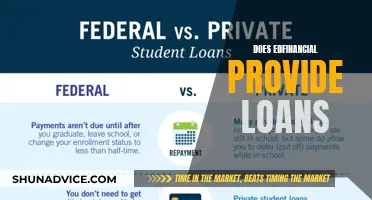
The COVID-19 pandemic has had a devastating impact on small businesses, and many have struggled to stay afloat. To help small businesses, the US government introduced the Economic Injury Disaster Loan (EIDL) program as part of the CARES Act. This program offers low-interest loans of up to $2 million to small businesses affected by the pandemic. In addition, the program also includes a grant of up to $10,000 that does not need to be repaid. This grant is designed to provide immediate relief to businesses while their loan application is being processed. So, does the EIDL loan advance have to be repaid?
What You'll Learn
- EIDL Advance grants of up to $10,000 do not need to be repaid
- Targeted Advance grants of up to $15,000 for qualified businesses are forgivable
- EIDL loans are repayable financial aid, unlike PPP loans
- EIDL loans are not forgivable and must be repaid
- EIDL loans have a fixed interest rate of 3.75% for businesses

EIDL Advance grants of up to $10,000 do not need to be repaid
The Economic Injury Disaster Loan (EIDL) is a loan offered to small business owners in Florida and throughout the United States during the Coronavirus (COVID-19) pandemic. The Small Business Administration (SBA) offered an EIDL Advance grant of up to $10,000 that does not need to be repaid. This advance is also called a grant and functions as one rather than a loan. It is important to note that the EIDL loan itself is not forgivable and must be repaid according to the terms agreed upon with the SBA.
The EIDL Advance grant was available to businesses applying for an EIDL, and the amount was determined by the number of employees ($1,000 per employee, up to $10,000). This grant is automatically forgiven and does not require an application or approval process. The repayment terms for EIDLs are favourable, with deferred payments for the first year (interest still accrues during this period) and low-interest rates.
To apply for the EIDL Advance grant, small businesses must first be eligible for the EIDL loan. Businesses that are eligible for the loan must satisfy a number of prerequisites, such as size standards. The SBA considers a business with 500 employees or fewer a small business. However, some industries render small businesses with a higher number of employees to still be considered small businesses. To qualify for an EIDL loan, a small business must be organized for profit, have a place of business in the U.S., and operate primarily within the U.S. Additionally, it must be independently owned and operated and must not be the dominant nationwide business in its field.
Once the application is submitted, the applicant will be assigned a loan officer, who can assign the advance within days if the application is successfully filed. The $10,000 EIDL advance, or emergency grant, must be applied for during the application process. This means that when filling out the initial loan application, the applicant must check the box requesting that their business be considered for the $10,000 grant. If the applicant does qualify for a normal EIDL, the loan advance will be deducted from the total loan eligibility.
EBt and Loan Eligibility: What's the Connection?
You may want to see also

Targeted Advance grants of up to $15,000 for qualified businesses are forgivable
The COVID-19 pandemic has had a significant impact on businesses, and as a result, the Small Business Administration (SBA) has provided support through the Economic Injury Disaster Loan (EIDL) program. This program offers financial assistance to small businesses facing challenges due to the pandemic. One aspect of the EIDL is the Targeted Advance grant, which provides grants of up to $15,000 to eligible businesses.
The Targeted Advance grant is specifically designed for businesses located in low-income areas that have experienced a significant decline in revenue. To qualify for this grant, businesses must demonstrate a 30% reduction in revenue during an eight-week period starting on March 2, 2020, or later, and they must have 300 or fewer employees. Additionally, businesses must be located in a designated low-income community.
The grant amount can be up to $15,000, and the best part is that it is forgivable. This means that qualified businesses do not have to repay the grant. This is different from the standard EIDL loan, which typically must be repaid. The forgivable nature of the Targeted Advance grant provides much-needed relief to struggling businesses, helping them cover expenses and stay afloat during challenging economic times.
To apply for the Targeted Advance grant, businesses can contact the SBA service providers and complete the necessary steps. It is important to note that the SBA has specific requirements and qualifications for this grant, so businesses should carefully review the guidelines and gather the necessary financial documentation to support their application. The SBA has generally closed EIDL applications; however, exceptions may be made for businesses that were previously approved but did not receive the full advance.
Education Loan: Covering Tuition and Living Expenses?
You may want to see also

EIDL loans are repayable financial aid, unlike PPP loans
The Economic Injury Disaster Loan (EIDL) is a federal loan program administered by the Small Business Administration (SBA) to provide financial assistance to businesses affected by disasters. While the EIDL loan itself is not forgivable and must be repaid, there are certain grants and advances under the EIDL program that do not require repayment.
The EIDL loan is designed to provide economic relief to businesses facing temporary revenue loss due to a disaster. The funds can be used to cover a range of working capital needs, such as payroll, rent, mortgage payments, and other operating expenses. However, there are restrictions on how the funds can be used, and they cannot be utilized for expansion or renovation.
Unlike the Paycheck Protection Program (PPP) loans, which offered partial or full forgiveness if used for specific purposes, EIDL loans are structured as traditional loans. Borrowers are expected to repay the full loan amount, with interest, according to the terms outlined in their loan agreements. The interest rates are typically set at 3.75% for small businesses and 2.75% for non-profits, and the repayment term can be up to 30 years, depending on the borrower's ability to repay.
While the EIDL loan must be repaid, there are specific grants and advances under the EIDL program that do not require repayment. These include the EIDL Advance Grants of up to $10,000 for small businesses and the Targeted EIDL Advance Grants of up to $15,000 for qualified businesses in low-income areas. These grants are designed to provide emergency funding while businesses await a decision on their EIDL loan application.
Conforming Loan Limit: Does LTV Impact It?
You may want to see also

EIDL loans are not forgivable and must be repaid
The Economic Injury Disaster Loan (EIDL) is a loan offered to small business owners in Florida and throughout the United States during the Coronavirus (COVID-19) pandemic. The EIDL program lets you apply for a grant of up to $10,000 that does not need to be repaid. This $10,000 advance is an emergency grant from the government, which is designed to provide small businesses with working capital to pay expenses like payroll costs, mortgage payments, and more, while their EIDL loan application is considered. These $10,000 advances do not have to be repaid and businesses are supposed to have access to these funds within a one-week period after beginning the application process.
The EIDL loan, however, is like a traditional business loan and will need to be repaid. The Small Business Administration (SBA) in March 2022 announced an additional six-month deferral option, allowing small business owners to defer their loan payments for a total of 30 months. The EIDL loan, which can be as high as $2 million, is generally not forgivable. You’ll need to repay an EIDL loan, but grants do not need to be forgiven or repaid.
The EIDL Advance was automatically forgiven and didn’t require an application or approval process. The EIDL Loan Forgiveness makes much-needed support available to businesses across the U.S. While grants are available under this program, the EIDL loans themselves are not forgivable.
Economic Injury Disaster Loan: To Repay or Not?
You may want to see also

EIDL loans have a fixed interest rate of 3.75% for businesses
The Economic Injury Disaster Loan (EIDL) is a federal relief program designed to assist small businesses, small agricultural cooperatives, and certain non-profit organisations that have experienced economic injury due to a declared disaster, including the COVID-19 pandemic. The EIDL program offers loans of up to $500,000 with a fixed interest rate of 3.75% for small businesses and 2.75% for non-profits. The term length for the EIDL loan is 30 years, providing ample time for businesses to recover financially before full repayment is due.
The EIDL loan is distinct from the Paycheck Protection Program (PPP) loan, which is forgivable and designed to help businesses retain their employees. In contrast, EIDL loans are generally repayable, with only specific grants under EIDLs being forgivable. The EIDL Advance Grant of up to $10,000, offered as an emergency grant while the EIDL loan application is considered, is forgivable and does not need to be repaid. This grant is available to small businesses and is intended to cover expenses such as payroll costs, mortgage payments, and other necessary business expenses.
To qualify for the EIDL loan, businesses must meet certain eligibility criteria, including demonstrating substantial economic injury due to the pandemic. The Small Business Administration (SBA) requires proof that the business has suffered as a direct result of the coronavirus outbreak. Additionally, businesses must meet specific size standards, with a limit of 500 employees for small businesses and 300 employees for targeted EIDL advances in low-income areas.
The EIDL loan application process involves gathering the necessary financial documentation, such as tax returns, profit and loss statements, and debt schedules. Applicants can also take advantage of other resources offered by the SBA, such as the SBA 7(a) loans, SBA 504 loans, and SBA Microloans, which cater to different funding needs. The SBA has streamlined the EIDL application process, but the high volume of applications has led to some delays and confusion.
The EIDL loan program has been a crucial source of financial support for small businesses affected by the COVID-19 pandemic. With its fixed and relatively low-interest rate of 3.75% for small businesses, flexible repayment terms, and absence of prepayment penalties, the EIDL loan has helped businesses stabilise their finances and focus on recovery in the aftermath of the pandemic.
Edfinancial's Loan Services: What You Need to Know
You may want to see also
Frequently asked questions
No, the EIDL loan advance is a grant that does not need to be repaid, even if you don't qualify for the normal EIDL.
The EIDL loan advance is up to $10,000.
Yes, the EIDL loan must be repaid.
You can apply for the EIDL loan advance during the application process for the EIDL loan. You must check the box that requests that your business be considered for the $10,000 grant.
Businesses are supposed to have access to these funds within a week of beginning the application process.







